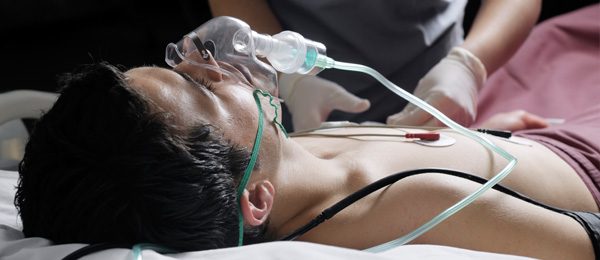
Positive pressure therapy in COVID-19 infection (PROVE)
Background:
SARS-CoV-2 causes respiratory tract infection. The severity of symptoms varies from mild to severe pneumonia and from mild to severe acute respiratory distress syndrome (ARDS). With surge in Covid-19, severe hypoxia patients are in high risk of death. We propose a pragmatic trial, use of a novel non-invasive PEEP (NIP) mask to reduce the risk of ARDS. Materialise Passive Non-Invasive PEEP (NIP) device enables a new non-invasive ventilation strategy. It delivers oxygen and create high positive pressure without the use of a ventilator by designing a 3D-printed connector that holds together standard medical equipment, such as a non-invasive mask,filter, and PEEP valve. The 3D-printed PEEP ventilation solution is currently available in several European countries. It can run on an oxygen cylinder or a wall outlet, obviating the need for a humidification or heating device.
Aim:
- Test the efficacy and safety of supplemental oxygen delivery through the Materialise Passive NIP mask in adult patients with COVID-19.
- Determine if administration of supplemental oxygen via the Materialise Passive NIP mask is superior to administration of oxygen through nasal cannula or a simple face mask in reducing the need for increased respiratory support, defined as the need for high flow oxygen via nasal cannula (high flow nasal oxygen (HFNO)) or continuous positive airway pressure (CPAP) or Bilevel Positive Airway Pressure (BiPAP) or invasive mechanical ventilation.
Design:
PROVE study is a prospective, multicentre, parallel arm, open label, Phase 2b/3 randomised controlled trial of oxygen delivery through nasal cannula or NIP masks in patients with confirmed COVID-19 infection
Methods:
The PROVE trial will recruit participants to the NIP mask or nasal cannula arm in a 1:1 ratio. Randomization will be done centrally using the REDcap database. The participants will be assessed over 3 hours for the reduction in their mean respiratory rate. A number of secondary outcomes including oxygen flow rate, oxygen saturation, use of ventilation and blood pressure support, and mortality will also be assessed. There are no additional trial-related risks for the participants being in the study. The study participants will continue to receive oxygen and other treatments, as per the local standard of care. Participants allocated to the new mask, will be continuously monitored for any discomfort due to the mask.
Current Status:
132 participants from 3 sites recruited for the study and the manuscript will be published shortly.










